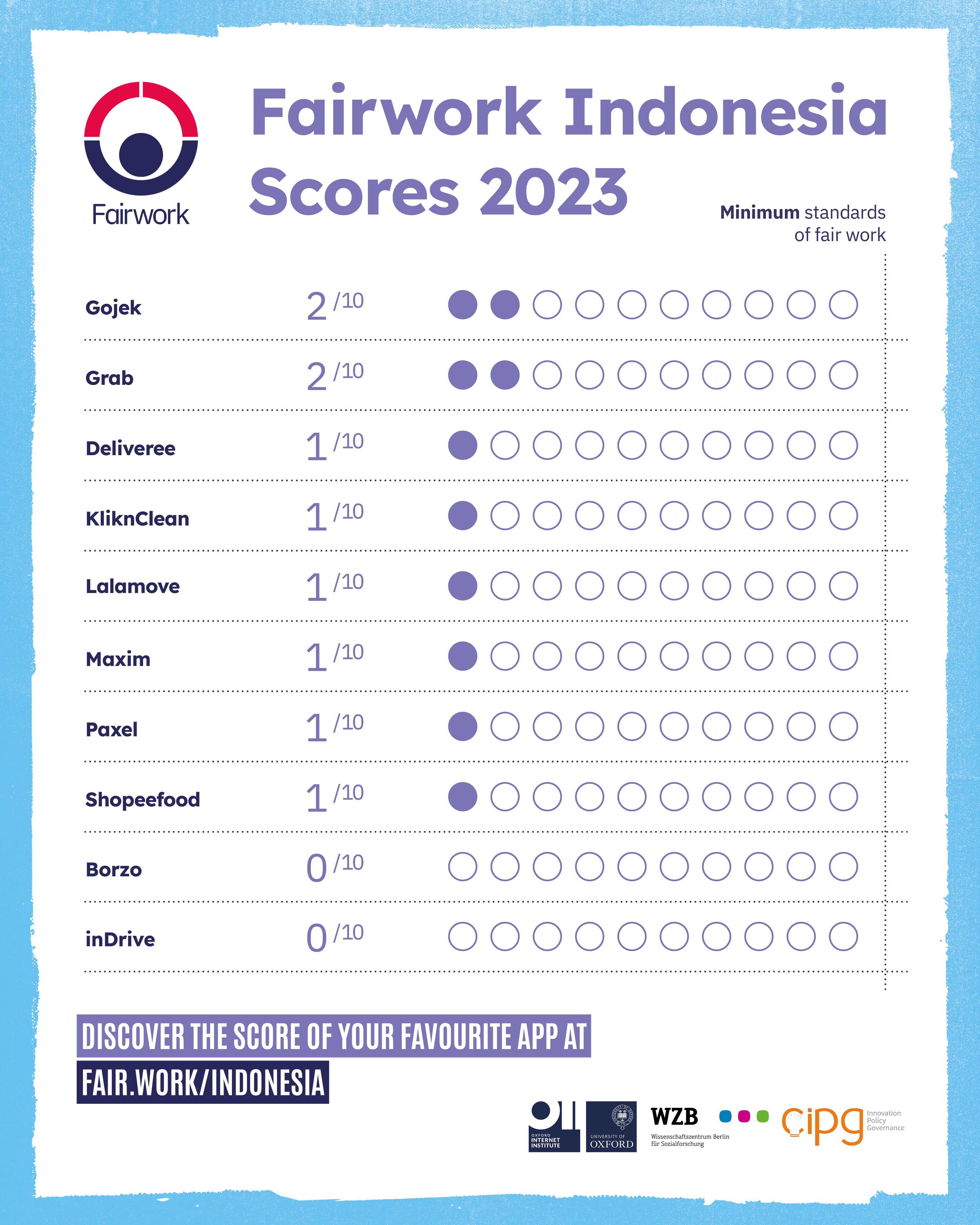New report reflects on the development and sustainability of digital labour platforms in Indonesia

Digitalisation has spurred transformations across various sectors, including the labour market and the digital-based economy. Indonesia has also experienced the impacts of this digitalization with the emergence of various digital work platforms, creating new job opportunities with low entry barriers. With easily accessible entry requirements, platform-based jobs have become a source of employment for those with limited job opportunities.
Today, platform-based work in Indonesia has expanded from just transportation services to encompass other services such as food and package delivery, as well as cleaning services. However, alongside this growth, several internal and external challenges accompany platform work development.
The Centre for Innovation Policy and Governance (CIPG), in collaboration with the Oxford Internet Institute, University of Oxford, evaluated and assessed working conditions in the Indonesian platform economy. The evaluation found that working conditions for platform workers have tended to stagnate and even deteriorate. The evaluation’s results are presented in ‘Fairwork Indonesia Ratings 2023: Labour Standards in the Platform Economy‘, Fairwork Indonesia’s third research report on the working conditions of digital platform workers.
‘Fairwork Indonesia Ratings 2023’ examines the challenges platform workers face and the factors contributing to their working conditions. It concludes that there remain massive inequalities in platform work practices. Upon evaluating Indonesia’s most prominent platforms against the five principles of Fairwork, the team found that none of the ten platforms evaluated meet the optimal standards for decent work for their workers. The absence of regulatory frameworks on platform work remains the main challenge that contributes to perpetuating these inequities.
Ratings

Key findings
Fair Pay: In 2023, Jakarta’s monthly minimum wage was set at IDR 4,901,798 which converts to IDR 28,171 per hour (USD $1.90 per hour). Using this figure as our threshold, we were not able to find evidence enabling award of a point for any of the ten platforms that we assessed this year.
Fair Conditions: KliknKlin and Paxel are the only two platforms that were awarded a point for this principle this year. We found sufficient evidence that the two platforms provide safety equipment, safety training, and call centres at no additional cost to the workers. However, we were not able to gather evidence of additional support provided to workers such as insurance, or compensation for when they were unable to work due to sickness or accident
Fair Contracts: Six platforms were awarded a point for this principle: Deliveree, Gojek, Grab, Lalamove, Maxim, and Shopeefood. The six platforms provide terms and conditions in Bahasa with a clearly identified contracting party, subject to Indonesian law, and rules on data protection and management. Their T&Cs are also available at all times on the web or in the worker’s app. However, we were unable to award the second point to any of the platforms as our findings indicate that platform T&Cs included clauses that exclude liability for negligence and/or which unreasonably exempt the platform from liability for working conditions and/or that prevent workers from effectively seeking redress for grievances that arise from the working relationship they have with the platform.
Fair Management: This year, Grab and Gojek are the only two platforms that were awarded a point for this principle, as they offered accessible channels through which workers could communicate with the platform, including appealing decisions around payments and deactivations. We were unable to award a point for the second threshold to any of the platforms because there was insufficient evidence that the platforms we studied had mechanisms that demonstrate the algorithms they use do not exhibit discriminatory outcomes for particular groups.
Fair Representation: We were unable to award a point to any of the platforms for this principle. Numerous groups and associations exist today that have been created by platform workers themselves. However, they lack legal standing and—while most platforms do not actively prevent their workers from joining such groups—none of the platforms have yet publicly acknowledged any of these groups or associations as legitimate collective representatives of the workers.
Nur Huda, a researcher at CIPG and Principal Investigator at Fairwork Indonesia, stated: “Discussions about platform work ideally should no longer be limited to online drivers or transportation platforms alone. Instead, we should view platform work as a new form of employment relationship that utilizes digital application technology to connect consumer demand with platform workers as service providers. This year’s evaluation results raise concerns about the long-term sustainability and economic fairness of platform work in Indonesia, especially from the workers’ perspective. Unfortunately, not many see this as a serious and urgent issue that needs to be addressed.”
What can I do? Fairwork Pledge
As part of Fairwork’s commitment to holding platforms accountable for their labor practices, particularly in promoting worker health, safety, and security, Fairwork invites Philippine organizations to announce their public support for decent working conditions in the platform economy by signing the Fairwork Pledge.
rganisations like universities, schools, businesses, investors and charities that make use of platform labour can make a difference by supporting platforms that offer better working conditions. Organisations have the option to sign up to the Pledge as an official Fairwork Supporter or an official Fairwork Partner. Those signing up to be a Supporter must demonstrate their support for fairer platform work publicly and provide their staff with appropriate resources to make informed decisions about what platforms to use. Becoming a Fairwork Partner entails making a public commitment to implement changes in their own internal practices, such as committing to using better-rated platforms when there is a choice.
More than 40 organizations, including GIZ, Solidarity Center, Learning Lions, WZB Berlin Social Science Center, and FES, have already signed the pledge. Join them in demanding a fairer future of work!